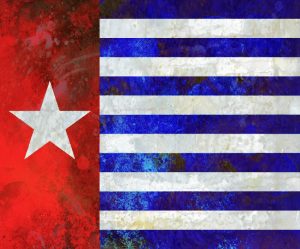Indonesia’s military has confirmed that three soldiers missing since a weekend ambush by separatist fighters in a remote part of upland Papua have been found dead.
On April 15, fighters from the West Papua National Liberation Army (TPNPB), the armed wing of the Free Papua Movement, opened fire on a group of 36 soldiers on patrol in Nduga Regency, a center of separatist activity in Highland Papua province. According to some international media reports, at least six died and 21 others fled into the jungle following the attack, while nine soldiers are believed to have been captured by the rebels.
Initially, army spokespeople only confirmed one death – that of a soldier who was shot and fell into a ravine. In a statement, Papua military spokesperson Col. Herman Taryaman confirmed that the bodies of this soldier, and the three recovered since “have been evacuated” from the area. Five wounded troops who were found the previous day had also been airlifted out. The Indonesian army says that the remaining troops have returned to their nearby base.
The soldiers were patrolling the area in an attempt to locate and rescue the New Zealand pilot Captain Philip Merthens, who was kidnapped by TPNPB rebels on February 7, after landing a small plane at Paro Airport in Nduga. The separatists said that Merthens would not be released until the Indonesian government acknowledged Papua’s independence, the goal of local independence fighters since the 1960s. Jakarta has pledged a harsh response to the abduction, the first that Papuan rebels have committed since 1996.
The announcement came a day after Adm. Yudo Margono, Indonesia’s military chief, dismissed a TPNPB claim that more than a dozen government soldiers has been killed during the ambush. In a statement on Monday, rebel spokesperson Sebby Sambom said in the TPNPB fighters were in possession of the remains of the 12 soldiers, including nine who he said “were arrested and executed” after being captured in the ambush.
Yudo and other high-ranking military officers flew to Papua on Monday. “I’m here to find out directly and accurately from our troops on the ground about the exact situation, so that we can evaluate our mission for the pilot,” Margono told a news conference in Timika, a town in neighboring Central Papua province.
Mehrtens’ capture has intensified conflict between the TPNPB and the Indonesian military in Papua, which has simmered since the region was incorporated into the Indonesian republic following a referendum in 1969. Independence activists claim that this “Act of Free Choice” was in fact tightly circumscribed and did not reflect the wishes of the region’s indigenous population.
The abduction is indicative of how the conflict has intensified over the past decade, as the Indonesian state has increased its efforts to economically and politically integrate the region, via the development of transport infrastructure and the encouragement of transmigration from other parts of the archipelago.
Sambom said in an earlier statement that separatists carried out the attack in response to Indonesia’s “massive military operation” in Papua and the killing of two rebels in a shootout with security forces last month, according to The Associated Press.
Indeed, the region appears to be locked into a spiral of conflict that shows no sign of slowing, let along reversing. All indications are that the Indonesian government will respond to this latest rebel attack by redoubling its efforts to eradicate the resistance movement by force. All of this almost guarantees a further response.

































